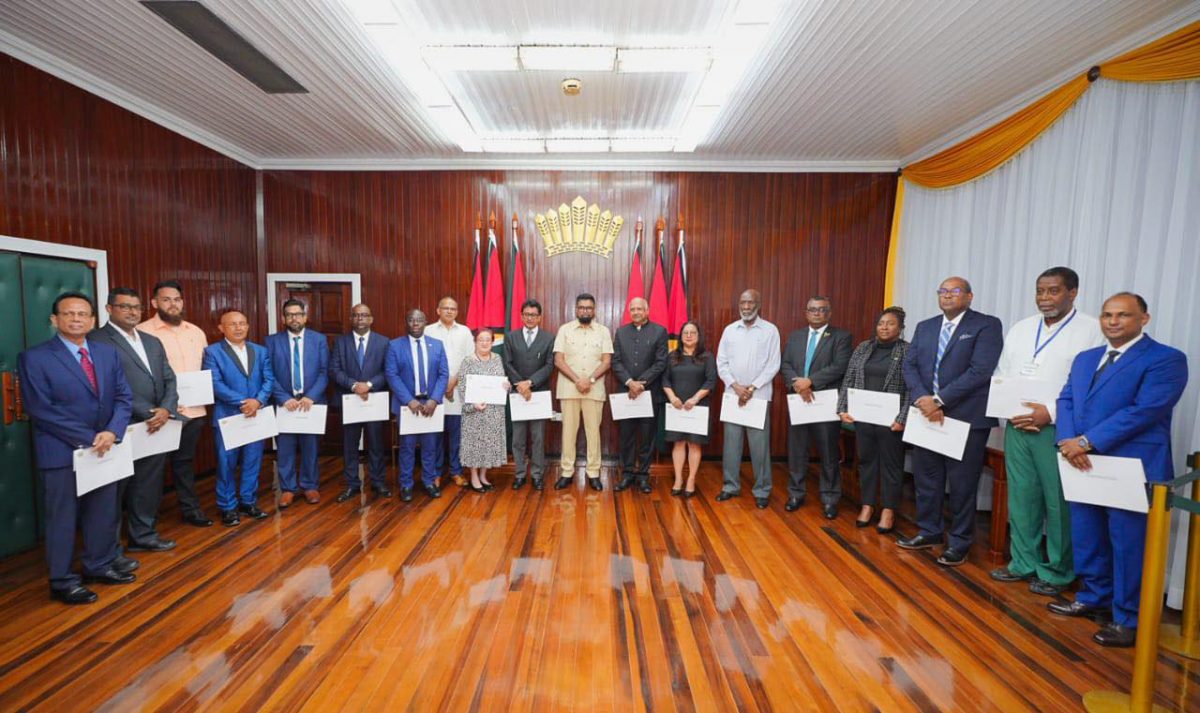Yesterday, 18 of 21 members of the Constitutional Reform Commission took the oath of office which was administered by President Irfaan Ali at the Office of the President.
At the swearing-in ceremony, former Chancellor of the Judiciary, retired Justice Carl Singh was named as Chairman.
Others sworn in were People’s Progressive Party (PPP) Members: Anil Nandlall, SC, Gail Teixeira, Dr Frank Anthony, Pauline Campbell-Sukhai and Kwame McCoy and APNU+AFC Members: Vincent Alexander, Sherwood Lowe, Ganesh Mahipaul and attorney at law Nigel Hughes.
Additionally, Aslim Singh of the Labour Movement; Chairman of The National Toshaos’ Council Derrick Rowan John; Private Sector Representative Ramesh Persaud; Representative of Women organizations, Dr Kim Kyte-Thomas; Chairman of the Youth Advisory Council, Dr Josh Kanhai; Imran Ally of the Muslim Youth Organization; Farmers Representative Adrian Anamayah and Representative of the Hindu Community Radha Krishna Sharma were also appointed commissioners.
A New and United Guyana Member, Timothy Jonas SC, Keoma Griffith Representative of the Christian Community and Member of the Guyana Bar Association Kamal Ramkarran will be appointed at a later date as they all were out of the jurisdiction.
President Ali during his address said “The nation’s constitution is its foundational law, which outlines the framework for governance, and defines the structure of government, allocates power, specifies the functions of the arms of the state and guarantees the rights of citizens”.
He was adamant that constitutional reform should be premised on several key issues against the backdrop of changes occurring.
“Political, societal and technological changes may present new challenges and opportunities that were not envisioned by the framers of the original Constitution or by its subsequent reforms,” he told those gathered after their oaths were administered.
The Guyanese leader is also hopeful that the newly formed body can work together in the best interest of citizens and uphold the core principles enshrined in the constitution.
He also admonished the newly formed commission to foster and promote social inclusion.
“Your ability to work together and achieve consensus will not only advance the cause of constitutional reform but also serve as an encouragement for greater political and social inclusion,” the President challenged.
The Constitution Reform Bill was passed in the National Assembly on November 7th 2022 and the expectation had been that the government would move swiftly to begin the process.
An entire year went by before there was substantial movement. Nandlall had attributed this to government’s focus on dealing with Venezuela’s aggression, which came at a time concurrent with his government’s timeline for the requisite processes to be triggered.
“The delay had to do with the distraction with matters connected to the territorial integrity and sovereignty of our country, but he [the President] has given firm instructions to the attorney general to dispatch the letters to the relevant persons and agencies inviting their nominations in accordance with, the constitutional reform commission act,” he said in December last year.
The bill, according to its explanatory memorandum, provides for the establishment of the CRC, its membership and terms of reference.
The bill provides for the President, acting by his deliberate judgment, to appoint a chair of the Commission.
The Commission is entitled to elect the deputy chairperson. Clause 7 of the bill provides that to execute the objectives of the legislation, the Commission shall review the Constitution of Guyana, to provide for the current and future rights, duties, liabilities and obligations of the Guyanese people. In furtherance of that purpose, it shall receive, consider and evaluate submissions for the alteration of the Constitution and report its recommendations to the Standing Committee for transmission to the National Assembly.
It is expected that that Commission will hold public hearings on constitutional reform throughout the country.






